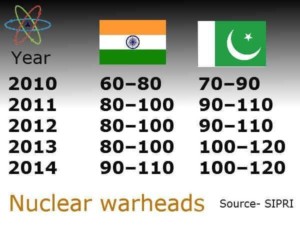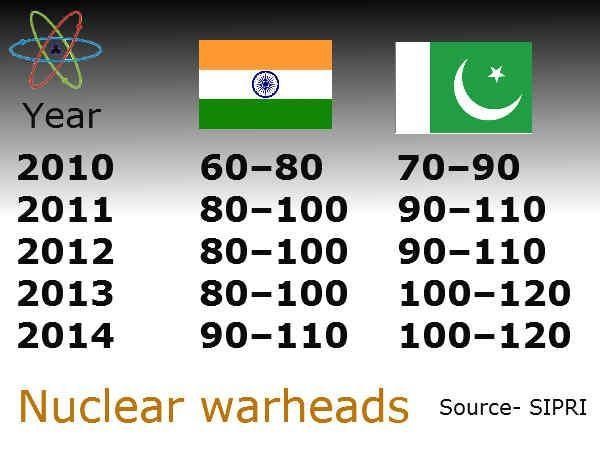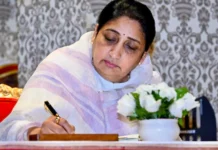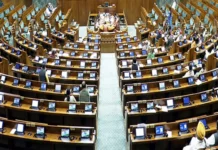 LONDON: Pakistan continues to be ahead of India when it comes to possessing nuclear warheads, with China having doubled the quantity, according to a report by a leading Swedish think-tank.
LONDON: Pakistan continues to be ahead of India when it comes to possessing nuclear warheads, with China having doubled the quantity, according to a report by a leading Swedish think-tank.
Pakistan is believed to have 140-150 nuclear warheads this year, 10 more than last year. In contrast, India is said to have 130-140 nuclear warheads, according to the annual nuclear forces data by Stockholm International Peace Research Institute (SIPRI).
“India and Pakistan are both expanding their nuclear weapon stockpiles as well as developing new land-, sea- and air-based missile delivery systems,” it said.
“China continues to modernize its nuclear weapon delivery systems and is slowly increasing the size of its nuclear arsenal,” SIPRI said.
Russia and the US hold over 92 per cent of the total warheads, it said.
SIPRI said nine countries – the US, Russia, Britain, France, China, India, Pakistan, Israel and North Korea – had 14,465 nuclear warheads at the beginning of 2018, of which 3,750 were actually deployed.
At the start of 2017, the total number of nuclear warheads was 14,935, it said.
The reduction is largely due to the arms control commitments by the US and Russia in the 2010 Treaty on Measures for the Further Reduction and Limitation of Strategic Offensive Arms (New START), the Stockholm-based organization said.
It said that France with 300 warheads, China 280, Britain 215, Pakistan 140-150, India 130-140, Israel 80 and North Korea 10-20 were all either deploying or planning to deploy new nuclear weapons system.
Despite making limited reductions to their nuclear forces, both Russia and the USA have long-term programmes under way to replace and modernize their nuclear warheads, missile and aircraft delivery systems, and nuclear weapon production facilities, it said.
SIPRI warned that modernization of nuclear weapons continues despite a decline in the total number of nuclear warheads.
“… the modernization programmes underway in the nuclear weapon-possessing states indicate that genuine progress towards nuclear disarmament will remain a distant goal,” says Shannon Kile, Senior Researcher with the SIPRI Disarmament, Arms Control and Non-proliferation programme. PTI







